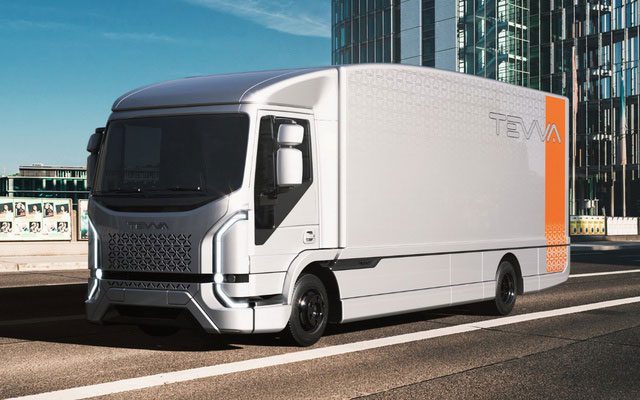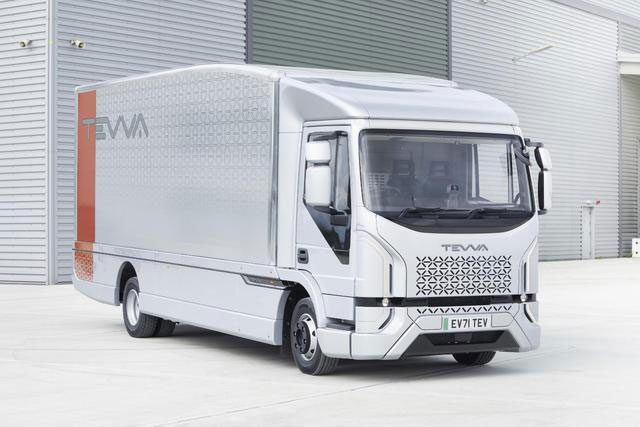Despite the excitement surrounding the potential of hydrogen fuel cell vehicles, the expansion of this sector still faces numerous challenges.
The Pinnacle of 7 Years of Technology Development
The UK-based startup Tevva launched a hydrogen fuel cell-powered heavy-duty truck on June 30. This vehicle represents the culmination of 7 years of technical development, including 350,000 km of testing.
With this launch, Tevva becomes the youngest company to enter the race, attracting interest from multinational corporations like Daimler Truck and Volvo.
Tevva has announced that it has raised $140 million in funding. Their hydrogen fuel cell truck boasts a range of nearly 500 km. Furthermore, the total cost of ownership for a hydrogen fuel truck could be comparable to that of a diesel truck.
Refueling with hydrogen will take 10 minutes, while charging the battery from “empty to full 100%” will take 5-6 hours. The company’s first hydrogen fuel cell truck weighs 7.5 tons, with plans for future models weighing 12 and 19 tons. The company aims to produce 3,000 trucks annually by 2023.

Tevva’s first hydrogen fuel cell truck weighs 7.5 tons.
In a statement, Tevva explained why the company combines hydrogen fuel cells with electric batteries. The company stated: “The fuel cell system supports the electric battery, extending the vehicle’s range and allowing the truck to carry more over longer distances“.
In addition to the hydrogen fuel cell truck, the company is also developing an electric truck with a range of nearly 260 km. Detailed information about both the electric and hydrogen models has been previously announced by Tevva.
Tevva trucks aim to address the immediate electrification needs of the transportation sector, amid the European Union’s commitment to achieving net-zero emissions by 2050 and proposing a ban on the sale of all polluting vehicles by 2035.
In the CNBC program “Street Signs Europe” aired on June 30, Tevva’s CEO Asher Bennett was asked if his company is looking to diversify into smaller vehicles.
Asher Bennett replied: “We are not interested in developing smaller trucks or pickups. In many cases, the technology to manufacture them is very similar to that of larger electric sedans. They perform very well“.
He added: “We are focusing heavily on heavy-duty trucks, and we are gradually moving towards heavier vehicles. This is because these segments are much more challenging to electrify“.
Existing Challenges
As governments around the world take action to mitigate the environmental impact of transportation, several companies in the road transport sector are seeking to develop low or zero-emission vehicles, including those powered by hydrogen.
Last month, Volvo Trucks announced that it had begun testing hydrogen fuel cell vehicles. The Swedish company claims their range could reach up to 1,000 km.

Tevva trucks will address the immediate electrification needs of the transportation sector.
Volvo Trucks, based in Gothenburg, stated that refueling these vehicles would take less than 15 minutes. Customer testing programs are set to begin in the coming years, with commercialization planned for the end of this decade.
In addition to hydrogen fuel cell trucks, Volvo Trucks, part of the Volvo Group, has also developed electric trucks. Not to be outdone, Daimler Truck, like Volvo Trucks and Tevva, is focusing on both battery-powered and hydrogen fuel vehicles.
In an interview with CNBC last year, Daimler Truck’s Chairman Martin Daum was asked about the debate between electric batteries and hydrogen fuel cells.
He stated: “We use both because both are… valuable“. He then explained how the different technologies would suit different situations.
While there is excitement in some quarters about the potential of hydrogen-powered vehicles, the expansion of this sector still faces obstacles, particularly regarding the development of infrastructure for refueling. The method of hydrogen production is also a consideration.
Both points were acknowledged by Volvo Trucks in June. The company pointed out challenges including “large-scale green hydrogen supply” as well as “the refueling infrastructure for heavy-duty vehicles is still not developed“.
Hydrogen can be produced in several ways. One method is through electrolysis, where electricity splits water into oxygen and hydrogen.
If the electricity used in this process comes from renewable sources like wind or solar, some would refer to the produced hydrogen as “green hydrogen” or “renewable hydrogen”. However, currently, most hydrogen production processes rely on fossil fuels, with the resulting product termed “blue hydrogen” or “gray hydrogen”.
For its part, Tevva stated that it will assist its customers in “safely and conveniently accessing sustainable and affordable hydrogen supply when they purchase or lease Tevva’s hydrogen“.




















































